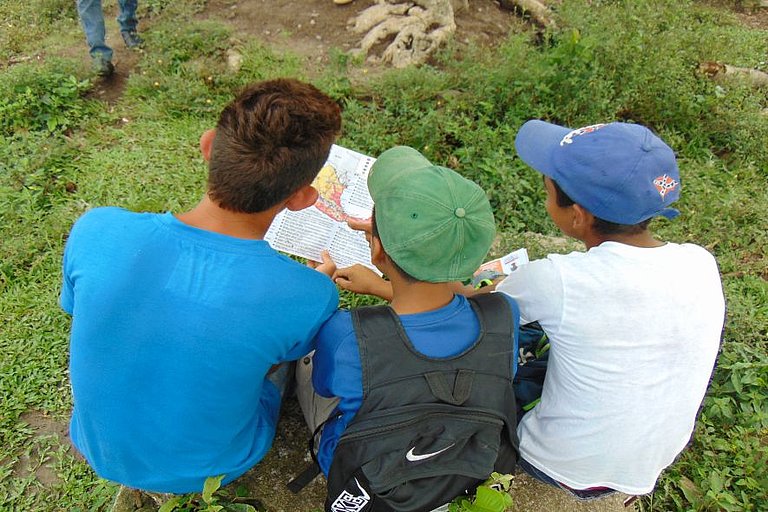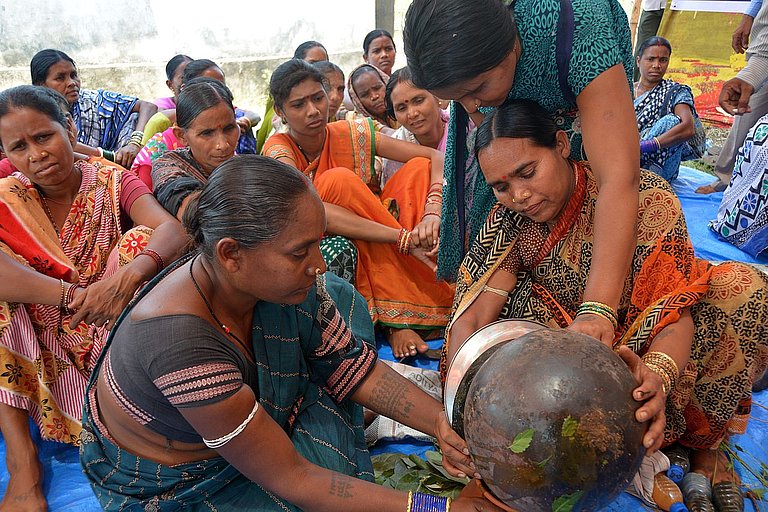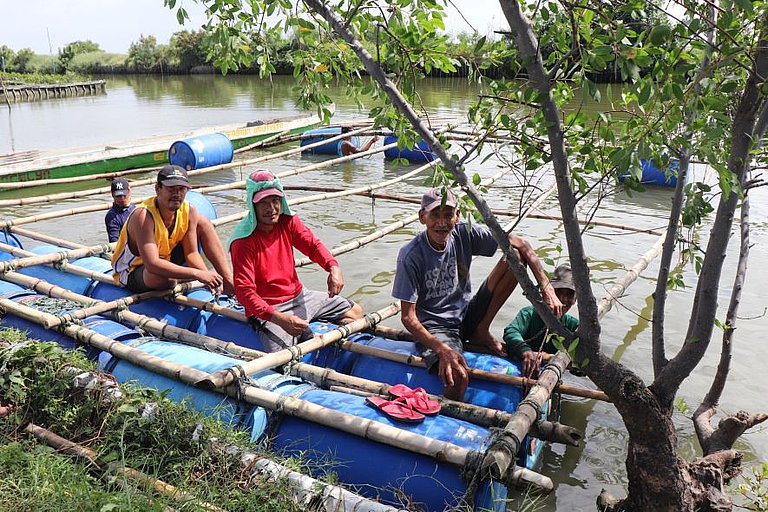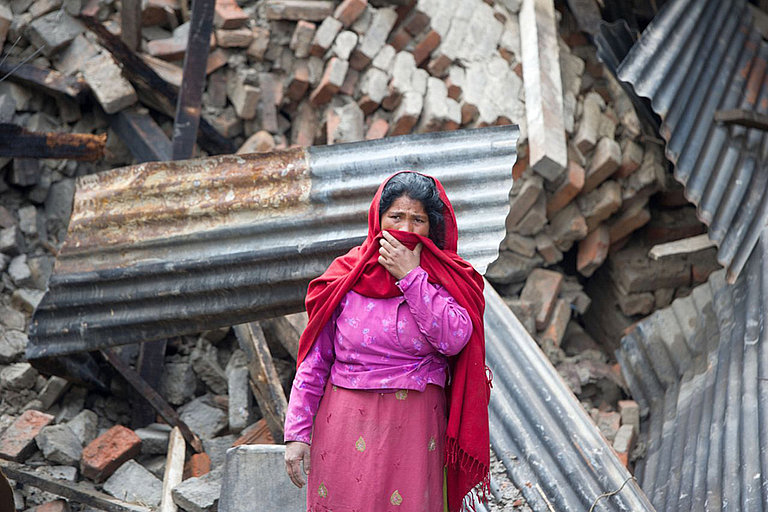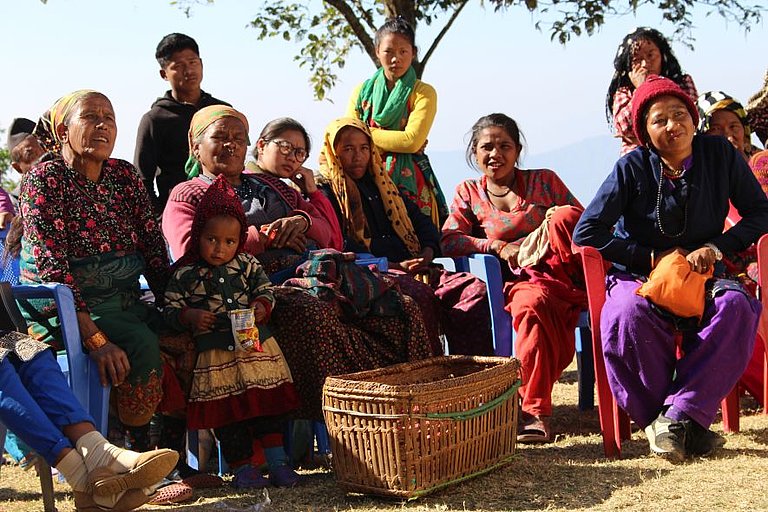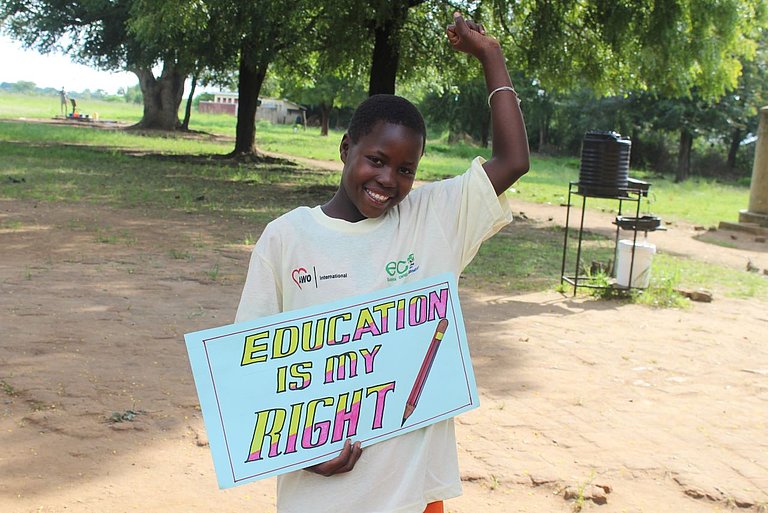More than 70 million people worldwide have been forced to flee war, violence and hopelessness. About 230 million people live as migrants far away from their home countries. Especially for migrant workers, migration often ends in precarious working conditions and exploitation. An estimated 30 million people are affected by human trafficking and forced labour.
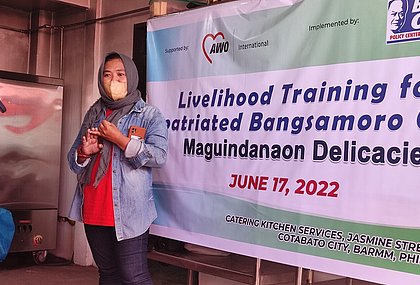
Combating human trafficking in the Philippines
The COVID-19 pandemic and its lingering effects increase the risk of Filipino domestic workers becoming victims of trafficking and other forms of exploitation. In 2021, AWO International and the Philippine NGO Ople Center formed a partnership to respond to these new challenges for Filipino migrant workers.
more information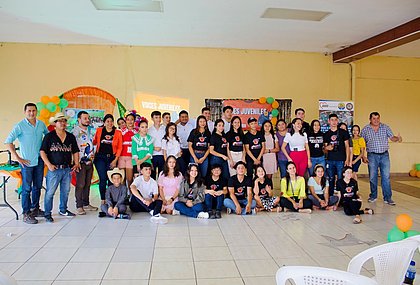
Education and solidarity for safe migration in Honduras and Guatemala
Every hour, 8 Hondurans flee the country in search of a better future. In 2022, more than 30,000 people were deported to Honduras from the US. OCDIH seeks to reduce the negative effects of migration in Honduras with education on rights and safe migration routes. In cooperation with ACOMUMSAM in northern Guatemala, volunteer families offer refuge to those who undertake this dangerous journey.
more information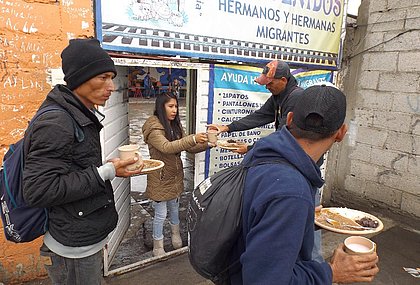
Strategies for the protection of migrants
Mexico experiences the entire migration cycle: Every year about 450,000 migrants from Central America cross the country, many of them staying in the country. But thousands of Mexicans are also on their way themselves. But migration harbours many dangers. Together with our partner organization UMUN, we are carrying out a project to reduce risks.
more information![[Translate to Englisch:] Erfolgreiche Kleinunternehmen: Der junge Mann verdient sein Geld nun mit dem Verkauf von Milkshakes (Foto: AWO International) [Translate to Englisch:] Erfolgreiche Kleinunternehmen: Der junge Mann verdient sein Geld nun mit dem Verkauf von Milkshakes (Foto: AWO International)](/fileadmin/_processed_/4/7/csm_OCDIH_II_Kiosk_mit_Milkshake_Verkauf_a6a244da61.jpg)
Combating violence and poverty as central causes of flight
The central causes of flight in Honduras include violence, poverty and a lack of prospects. Together with its project partner OCDIH, AWO International is making a contribution to combating the causes of flight in the region. Educational and income-generating measures are intended to give young people and young adults new perspectives for a self-determined life.
more information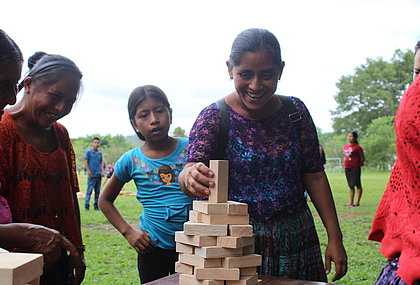
The results of a long journey
The Municipal District of Ixcán in Guatemala is inhabited mostly by indigenous peoples and is characterized by high rates of both moderate and extreme poverty. For many of its residents, migration is the only solution. Since 2013, we have been working together with ACCSS in the care of migrants and returnees in Ixcán, and in the promotion of alternatives to migration. This project will end in 2024.
more information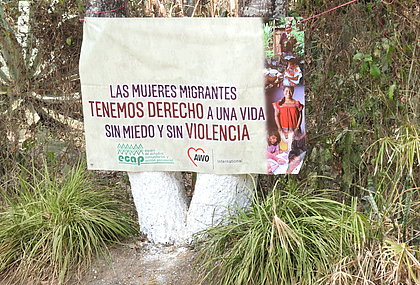
Strengthening rights for a population marked by emigration
Each day, many inhabitants of Chimaltenango and Huehuetenango leave their place of origin in search of better prospects, venturing to one of the most dangerous routes in the world to Mexico or the United States. Together with ECAP, we work in the promotion of rights and the empowerment of its inhabitants to change a reality that has been going on for more than 50 years.
more information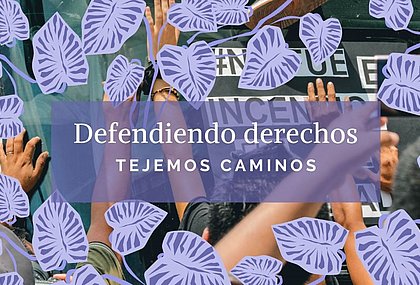
Assistance and rights access for migrants in Tapachula, Mexico
In 2021, more than 130,000 asylum applications were filed in Mexico, making it the third country in the world with the most applications. About 90,000 of these cases were initiated in the city of Tapachula, in the department of Chiapas (WOLA 2021). The city is now known as a "prison city" for migrants and asylum seekers. The Fray Matías Human Rights Center works to strengthen access to rights and services for people in diverse contexts of mobility, with an emphasis on women and girls, in Tapachula.
more information![[Translate to Englisch:] Eine Mitarbeiterin und Partizipierende bei einem Workshop für die Herstellung von Hygieneprodukten (Foto: Carlos Cano/ AWO International) [Translate to Englisch:] Eine Mitarbeiterin und Partizipierende bei einem Workshop für die Herstellung von Hygieneprodukten (Foto: Carlos Cano/ AWO International)](/fileadmin/_processed_/6/3/csm_Carlos_Cano_x_ACCSS_1_1280x800_b24e28b01c.jpg)
Labour migration in Guatemala
In Guatemala, together with our partner organisation ACCSS, we educate potential migrants about safe migration, provide psychosocial support for family members and returnees, and work with youth organisations to promote alternatives to labour migration.
more information![[Translate to Englisch:] Um Alternativen zu schaffen und Einkommensquellen zu kreieren, lernen die Migrant*innen die Produktion eigener Produkte (Foto: Carlos Cano/ AWO International) [Translate to Englisch:] Um Alternativen zu schaffen und Einkommensquellen zu kreieren, lernen die Migrant*innen die Produktion eigener Produkte (Foto: Carlos Cano/ AWO International)](/fileadmin/_processed_/3/f/csm_Carlos_Cano_x_ECAP_1280x800_897135c5c1.jpg)
Strengthening the right of migrants in Guatemala
Every day, 350 Guatemalans go on one of the most dangerous migration routes in the world to Mexico or the USA. Together with its project partner ECAP, AWO International explains the migration routes and rights of migrants and provides psychosocial support for returnees and family members in their communities of origin.
more information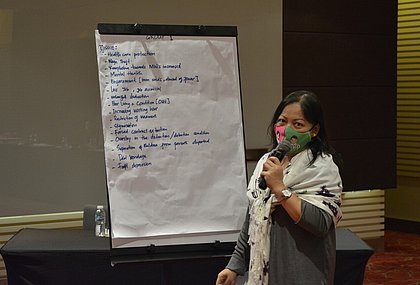
Promoting the rights of migrant workers in Southeast Asia
Labour migration in Southeast Asia is a phenomenon that has existed for centuries. Despite the economic benefits for countries of origin and destination, the situation of migrants and their access to social services is often precarious. Since 2021, AWO International, together with its local partner organisation Migrant Forum Asia (MFA), has been campaigning for the rights of migrant workers in Southeast Asia.
more information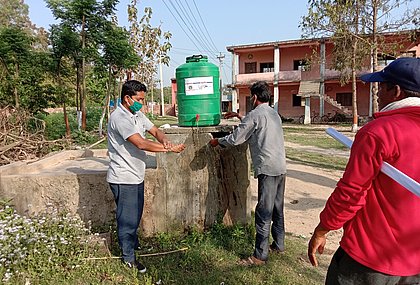
Corona emergency aid in Nepalese quarantine centres
In Nepal, provisional quarantine centres were set up for the returning migrant workers from India. The infrastructure of these health centres is quite precarious and the care of the people is insufficient. AWO International supports the project by supplying hygiene products and running an awareness campaign.
more information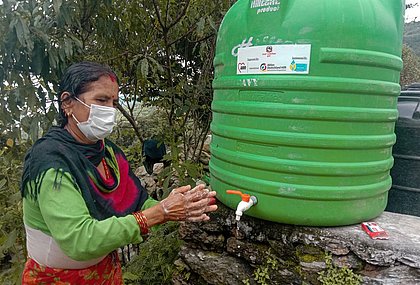
Coronavirus prevention in the Nepal-India border region
A vast movement of Nepalese labour migrants returning to their home country was triggered by the outbreak of the COVID 19 pandemic in India. Tens of thousands of people set out with their belongings on a long journey with an uncertain outcome; partly by bus, partly by bicycle or on foot.
more information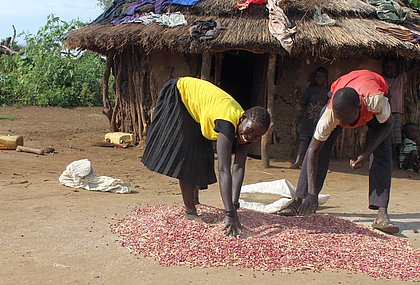
Fight against human trafficking in Karamoja
Together with our local partner organization ECO, we support smallholder families in Karamoja to improve their living conditions, food and nutrition security, and reduce their risk of becoming victims of human trafficking.
more information![[Translate to Englisch:] Gegen Vertreibung und unsichere Migration: In Gaibandha, Bangladesch schaffen wir neue Perspektiven für Migrant*innen und Klimavertriebene (Foto: AWO International/GUK) [Translate to Englisch:] Gegen Vertreibung und unsichere Migration: In Gaibandha, Bangladesch schaffen wir neue Perspektiven für Migrant*innen und Klimavertriebene (Foto: AWO International/GUK)](/fileadmin/_processed_/e/d/csm_Bangladesch_GUK_a2989b48a9.jpg)
Against displacement and unsafe migration - new perspectives for Gaibandha in Bangladesh
Gaibhanda in northern Bangladesh is one of the poorest regions in the country. Due to the climatic conditions, it is particularly difficult for the inhabitants here to support themselves. As a result, more and more inhabitants are leaving their home villages to work elsewhere. Our project with the local partner organization Gana Unnayan Kendra, or GUK for short, aims to address some of the problems of migration and displacement due to poverty and climate change.
more information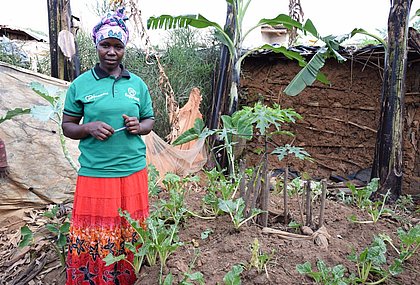
Improvement of living conditions in the Nakivale refugee camp
In Isingiro District in southwestern Uganda, the proportion of refugees is 19 percent. With our partner organization COVOID, we are improving living conditions for refugees and locals by strengthening nutrition, income and social cohesion.
more information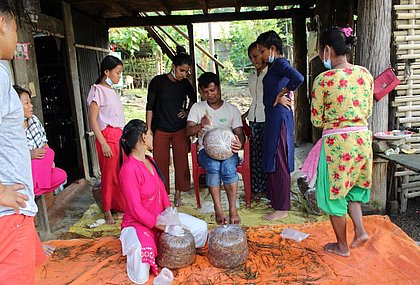
Youth groups for social change in Ilam
In Ilam, a district bordering the tea plantations in Darjeeling, India, AWO International works together with the Human Rights Forum Nepal, HuRF for short. The project focuses on strengthening youth groups who work for safe migration and against human trafficking in their communities.
more information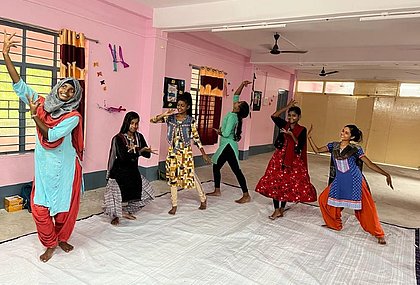
Human trafficking and traumas - a way out through dance and movement therapy
In the foothills of the metropolis of Kolkata in the Indian state of West Bengal, AWO International works with the partner organization Kolkata Sanved against human trafficking. The project focuses on healing and empowering affected and disadvantaged women and girls through the medium of dance and movement therapy.
more information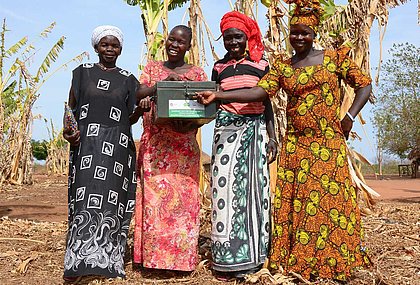
Improving living conditions for refugees and host communities in northern Uganda
Bidibidi is one of the largest camps for refugees in the world. Many of the people are living on the margin of poverty, and food insecurity is a major challenge. Together with our partner AFARD, we support refugees to improve their situation.
more information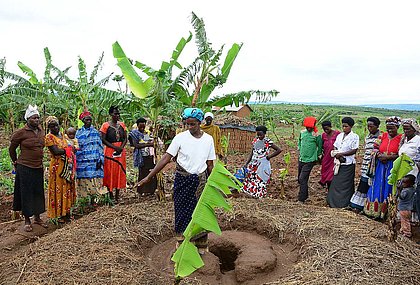
Food security for refugees and host communities in northern Uganda
The Lamwo district in northern Uganda is one of the poorest regions in the country. Nevertheless, the communities here take in refugees from South Sudan. Our project supports refugees and local communities in securing their food, increasing their income and strengthening social cohesion.
more information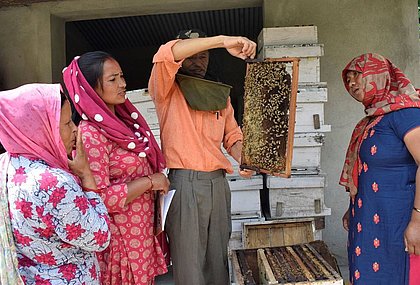
Chances for a better future in the Far West of Nepal
The Far West of Nepal is home to a large proportion of those Nepalese who migrate to India in search of work. There is a lack of programmes in this region to strengthen the rights of migrants, to create prospects for them to stay and to combat human trafficking. Our partner organization National Environment and Equity Development Society, NEEDS for short, is the only organization working on the issue of safe migration in Doti and Kanchanpur Districts.
more information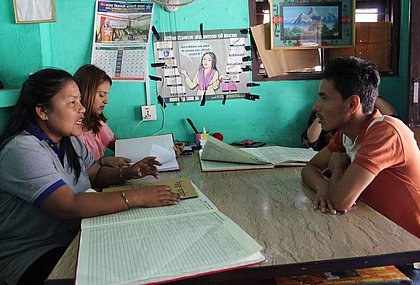
How we stand up for women in Makwanpur
Preventing human trafficking and promoting the political and socio-economic participation of women: This is what AWO International and its partner organisation Women Skill Creation Centre, WoSCC for short, are working for in Makwanpur District in Nepal.
more information![[Translate to Englisch:] Im Rotlichtviertel Bowbazaar unterstützen wir Frauen mit berufsvorbereitenden Trainings (Foto: AWO International/SKHM) [Translate to Englisch:] Im Rotlichtviertel Bowbazaar unterstützen wir Frauen mit berufsvorbereitenden Trainings (Foto: AWO International/SKHM)](/fileadmin/_processed_/8/4/csm_AWO_India_SKHM_cb40d9f93e.jpg)
New perspectives for the residents in the red light district of Kolkata
Bowbazaar is one of the oldest and largest red light districts in the metropolis of Kolkata in West Bengal, India. Here we work with our partner organisation South Kolkata Hamari Muskan, SKHM for short. The project aims to reduce gender-based violence and offers women the opportunity to go to a “Safe Space”. In addition, we provide health care and education and show the residents alternative employment opportunities.
more information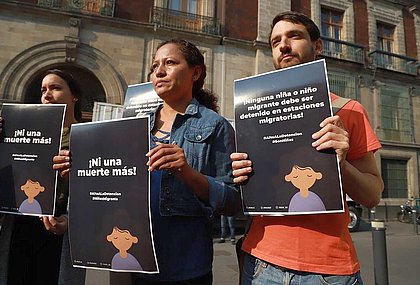
Lobby work to strengthen the rights of young migrants and returnees
The focus of our Mexican project partner IMUMI is mainly on lobbying. Together with a network of NGOs, IMUMI campaigns for the allocation of protection measures for unaccompanied minors and advocates access to education for children and young people of transnational families.
more information![[Translate to Englisch:] Die Crew der Ocean Viking bei einem Rettungseinsatz im Mittelmeer (Foto: Laurence Bondard/SOS MEDITERRANEE) [Translate to Englisch:] Die Crew der Ocean Viking bei einem Rettungseinsatz im Mittelmeer (Foto: Laurence Bondard/SOS MEDITERRANEE)](/fileadmin/_processed_/a/8/csm_SOS_MED_Laurence_Bondard_SOS_MEDITERRANEE_first_rescue_17a5c33218.png)
Civilian sea rescue in the Mediterranean Sea
Since February 2016 we have been supporting SOS HUMANITY (formerly SOS MEDITERRANEE), an organization that is dedicated to save lives at sea. The balance sheet confirms the urgent need for operations in the Mediterranean: More than 30,000 people have been rescued and taken care of onboard so far.
more information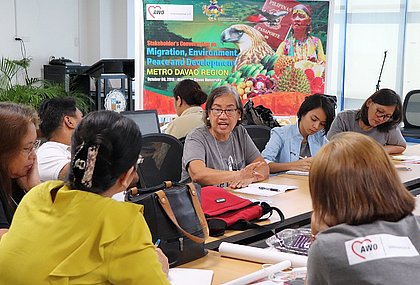
Protecting migrant workers from exploitation and abuse
Every day, many women from the island of Mindanao leave their families to migrate abroad for work. A large percentage end up being exploited and abused. Together with our partner organization, MMCEAI, we aim to facilitate for a safer migration process for all stakeholders involved.
more information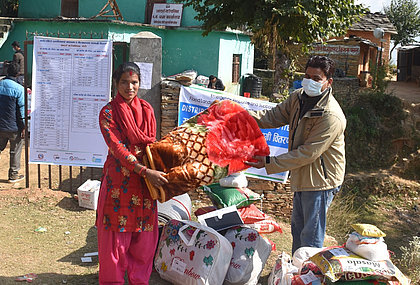
Emergency aid and reconstruction after flooding
Due to the continuous heavy rainfalls following the regular monsoon season, serious flooding and landslides occurred in western Nepal in October 2021. Twenty-one people lost their lives, and hundreds of homes were damaged or completely destroyed. Within a short time, our emergency relief team was on site to provide immediate aid.
more information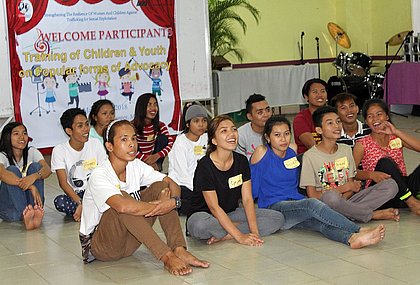
Halting child trafficking and sexual exploitation
Time and again, children and women on the Philippine island of Mindanao become victims of human trafficking for sexual exploitation. In addition, cases of sexual abuse on the Internet are becoming more frequent. Together with our partner organization Child Alert Mindanao, we implemented protective measures and education programmes to strengthen the awareness on and protection of the rights of children and women.
more information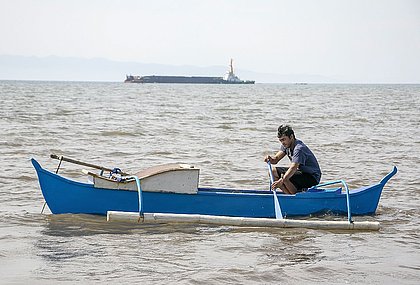
Plastic waste instead of fish, exploitation instead of income
The coastal communities of the Philippine province of Sarangani depend heavily on fishing. But commercial fishing fleets empty fish stocks and fishermen lose their livelihoods. If they are hired for industrial fishing, they often fall victim to exploitation and human trafficking.
more information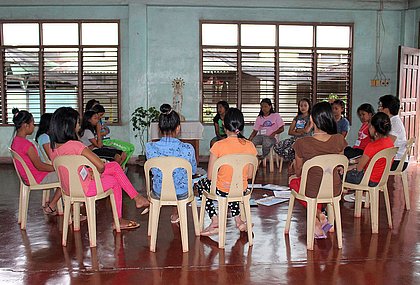
Fight against sexual exploitation of girls and women in Davao
Poverty and unemployment are the main causes that push many girls and women in Davao to become prostitutes and victims of human trafficking. Many girls are only 14 years old. Together with our partner organization – Talikala, we work to protect women and girls from sexual exploitation.
more information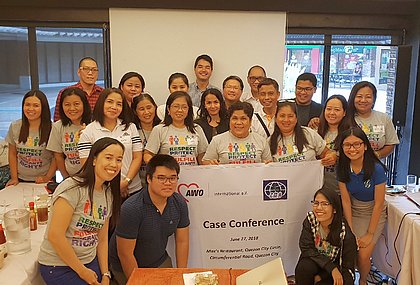
Strengthening the rights of domestic workers in migration
About 10 percent of the Philippine population live and work abroad as migrants. This is mainly due to poverty and a lack of income opportunities in the country. Many women work as domestic helpers, where they are often exposed to abuse and exploitation. Together with our partner organization Center for Migrant Advocacy, we work to protect migrant domestic workers and their rights.
more information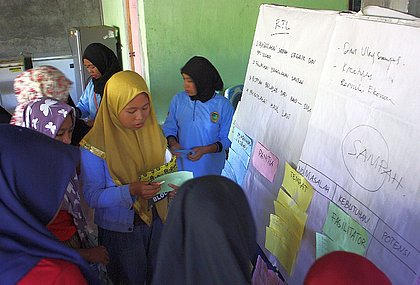
Protecting migrant women from Lombok from human trafficking and violence
Poverty and a lack of job opportunities in many communities on the island of Lombok push people to migrate to seek better economic prospects; a large percentage of these migrants often become victims of human traffickers. Together with our partner organization – ADBMI, we are implementing a project to protect migrating women and men.
more information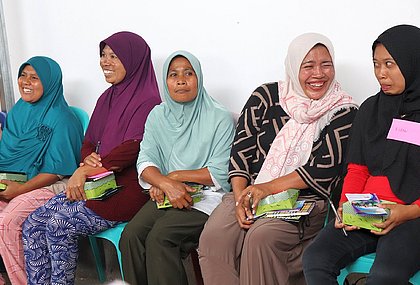
Safe migration for migrants from Lombok
Extortion, exploitation and violence are violations of rights that happen to many migrant workers. In their search for a better life for themselves and their families, they often end up in extremely precarious working conditions. Together with our partner organization - PPK, we worked for the protection and rights of migrant workers.
more information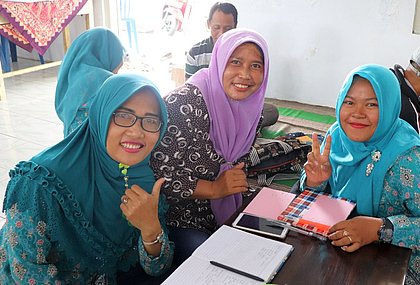
Strengthening rights for migrant workers across borders
Hundreds of thousands of people leave Indonesia every year in search of better income. Many of them run the risk of becoming victims of abuse, exploitation and human trafficking. Together with our partner organization - INFEST, we are committed to facilitating safe migration and promoting decent working conditions in Indonesia and Malaysia.
more information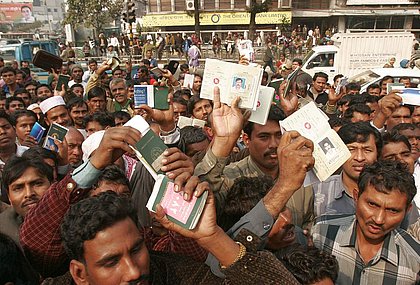
Safe migration in Bangladesh
Hundreds of thousands of people from Bangladesh leave their home country every year to work abroad. The conditions under which many migrants have to work and live are usually catastrophic. In order to improve their situation, AWO International, together with the local partner organization WARBE, is implementing a project for safe migration in Bangladesh.
more information![[Translate to Englisch:] Gemeinsam mit unseren Partnerorganisationen setzen wir uns für eine sichere Migration und gegen Menschenhandel ein. (Foto: AWO International) Together with our partner organisations, we promote safe migration and combat human trafficking. (Picture: AWO International)](/fileadmin/_processed_/f/b/csm_Rights_Jessore_DSC_0076_a1ba7cec1d.jpg)
Combating human trafficking and promoting safe migration
Every day thousands of people leave Bangladesh to work in other countries. Migration flows- including within the country - are a breeding ground for human trafficking. Many migrant women are sold and exploited as cheap labour. In cooperation with our partner organization Rights Jessore, we promote safe migration and take action against human trafficking.
more information